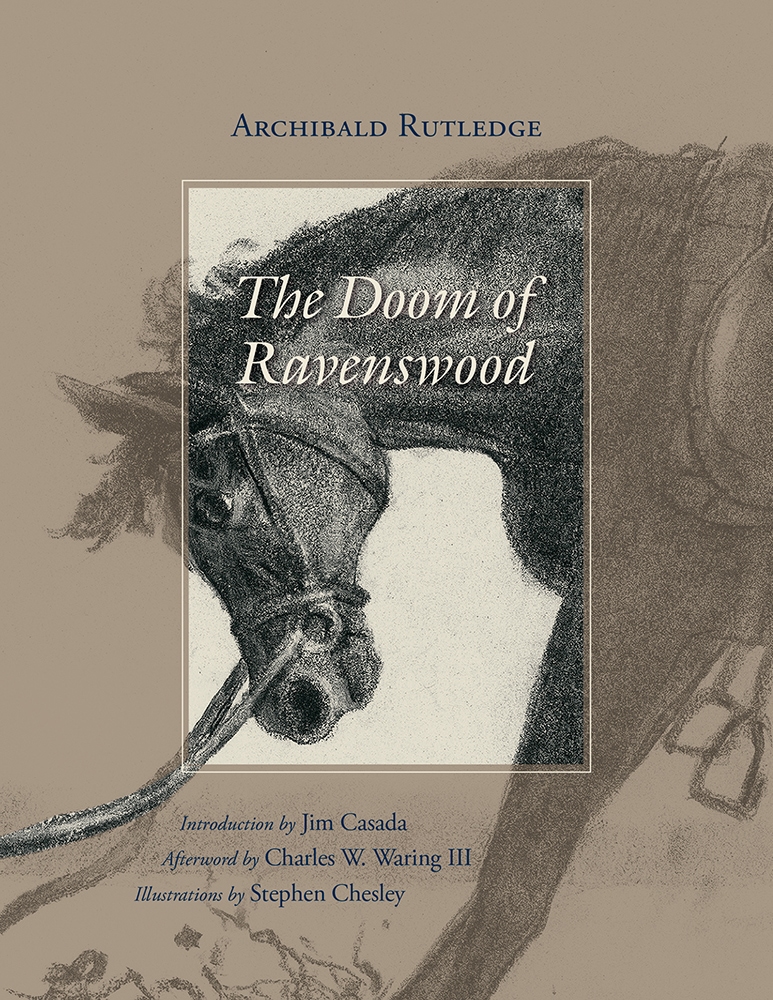A newly illustrated edition of an outdoor adventure story by South Carolina's first poet laureate
Archibald Rutledge's story "The Doom of Ravenswood" is a harrowing account of the power of the natural world and of the dangers for humans and animals alike to be found in the ominous swamps of the South Carolina lowcountry. As the narrator of this cautionary tale is riding home astride his faithful horse, Redbird, to Ravenswood Plantation, he is compelled to stop along the isolated road to pick wildflowers. But the untamed wilderness has laid a trap for the traveler, and he quickly finds himself sinking helplessly into the inescapable pull of the morass. With Redbird his only ally in this deadly predicament and with fate and nature set squarely against him, the narrator must use his wits if he is to survive.
The short story "The Doom of Ravenswood" was written for publication in an early twentieth-century boy's magazine and was first collected in the privately printed Eddy Press edition of Old Plantation Days (c. 1913). Limited to just a few hundred copies, the Eddy Press edition is highly prized by Rutledge collectors and includes these four stories—"Claws," "The Doom of Ravenswood," "The Egret's Plumes," and "The Ocean's Menace"—not found in the more widely available 1921 Stokes edition of Old Plantation Days.
A project of South Carolina Humanities benefiting the South Carolina literary programs, this new edition of The Doom of Ravenswood is illustrated in handsome charcoal etchings by southern artist Stephen Chesley. Award-winning outdoors writer and noted Rutledge scholar Jim Casada provides the volume's introduction and Lillian Smith Award-winning writer William Baldwin offers an afterword.
Archibald Rutledge (1883–1973) was South Carolina's most prolific writer and the state's first poet laureate. His nature writings garnered him the prestigious John Burroughs Medal.
Jim Casada has written or edited more than forty books, contributed to many others, and authored some five thousand magazine articles. Casada has edited five Rutledge anthologies—Hunting and Home in the Southern Heartland, Tales of Whitetails, America's Greatest Game Bird, Carolina Christmas, and Bird Dog Days, Wingshooting Ways. A past president of the South Carolina Outdoor Writers Association, the Southeastern Outdoor Press Association, and the Outdoor Writers Association of America, Casada has been honored with more than 150 regional and national writing awards. He serves as editor at large for Sporting Classics magazine.
Charles W. Waring III has edited, published, and written prefaces for four books, the last of which was The Way It Was in Charleston published by Evening Post Books. Waring has written numerous features, short stories, poems, and editorials on conservation, hunting, and fishing and he is the founder, editor, and publisher of the Charleston Mercury newspaper.
Stephen Chesley is a semiabstract artist working primarily in oils, charcoal, and metal. His work has been featured in solo and group exhibitions and has been honored with a fellowship from the National Endowment for the Arts. Chesley's previous collaborations with South Carolina Humanities were Archibald Rutledge's Claws and an illustrated chapbook edition of the Julia Peterkin short story "Ashes" in 2012.
"When I was a fifteen-year-old boy with burgeoning dreams of being a writer, my Beaufort High School English teacher Gene Norris introduced me to Archibald Rutledge at Hampton Plantation. Mr. Rutledge was the first professional writer I had ever met, and he was magnificent and generous and gracious. That day I learned what it should mean to be a writer and a teacher, and it shaped my life immeasurably. The University of South Carolina Press and the Humanities CouncilSC are reprinting five short stories from Archibald Rutledge, not seen in print for a century, and enhancing them with exquisite original illustrations from South Carolina artist Stephen Chesley, a masterful introduction from Rutledge scholar Jim Casada, and new afterwords from some of today's finest outdoors writers. These books remind us of Mr. Rutledge's command of the English language, his great skills of observation of the natural world, and his fondness for distilling universal truths from stories of local essence. They also introduce new generations to the storyteller who was South Carolina's first poet laureate and perhaps its most prolific writer. It is good to have Mr. Rutledge with us once more."—Pat Conroy
